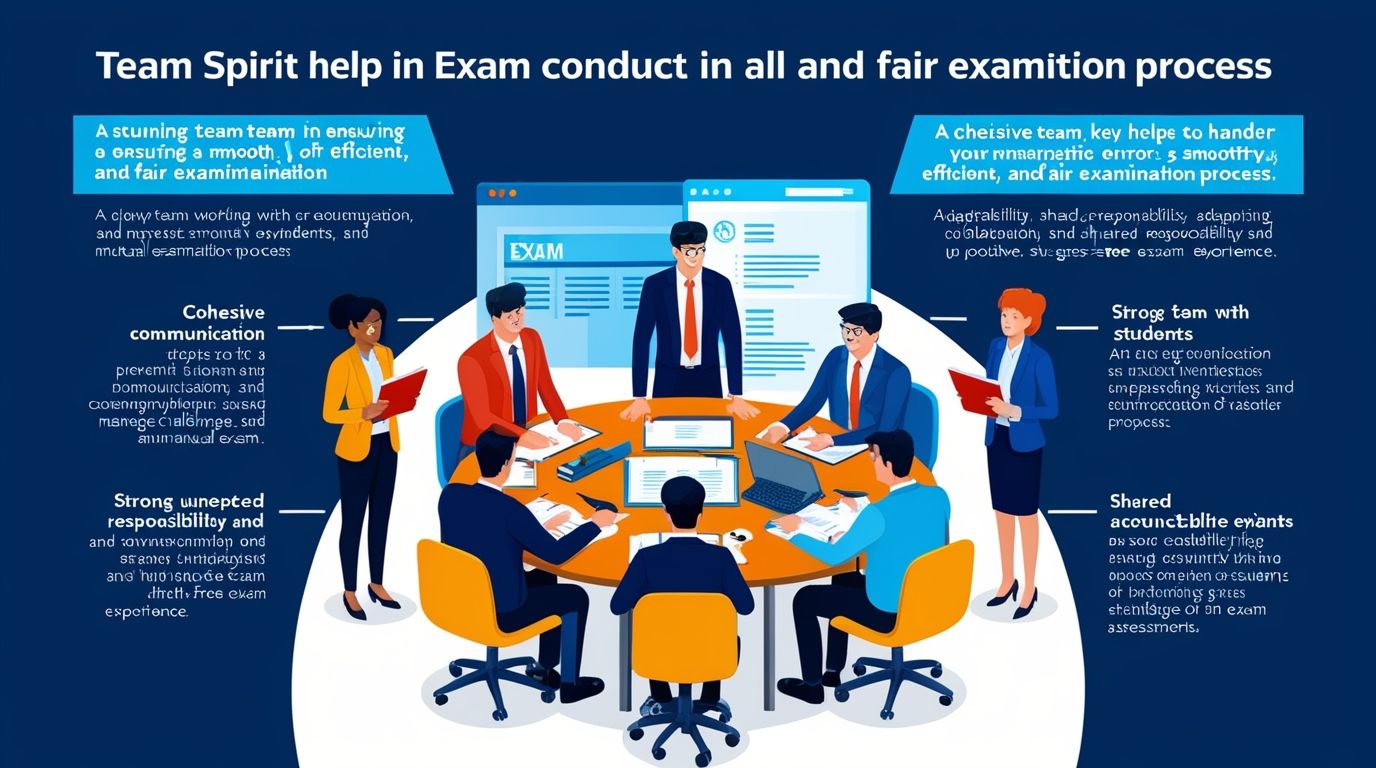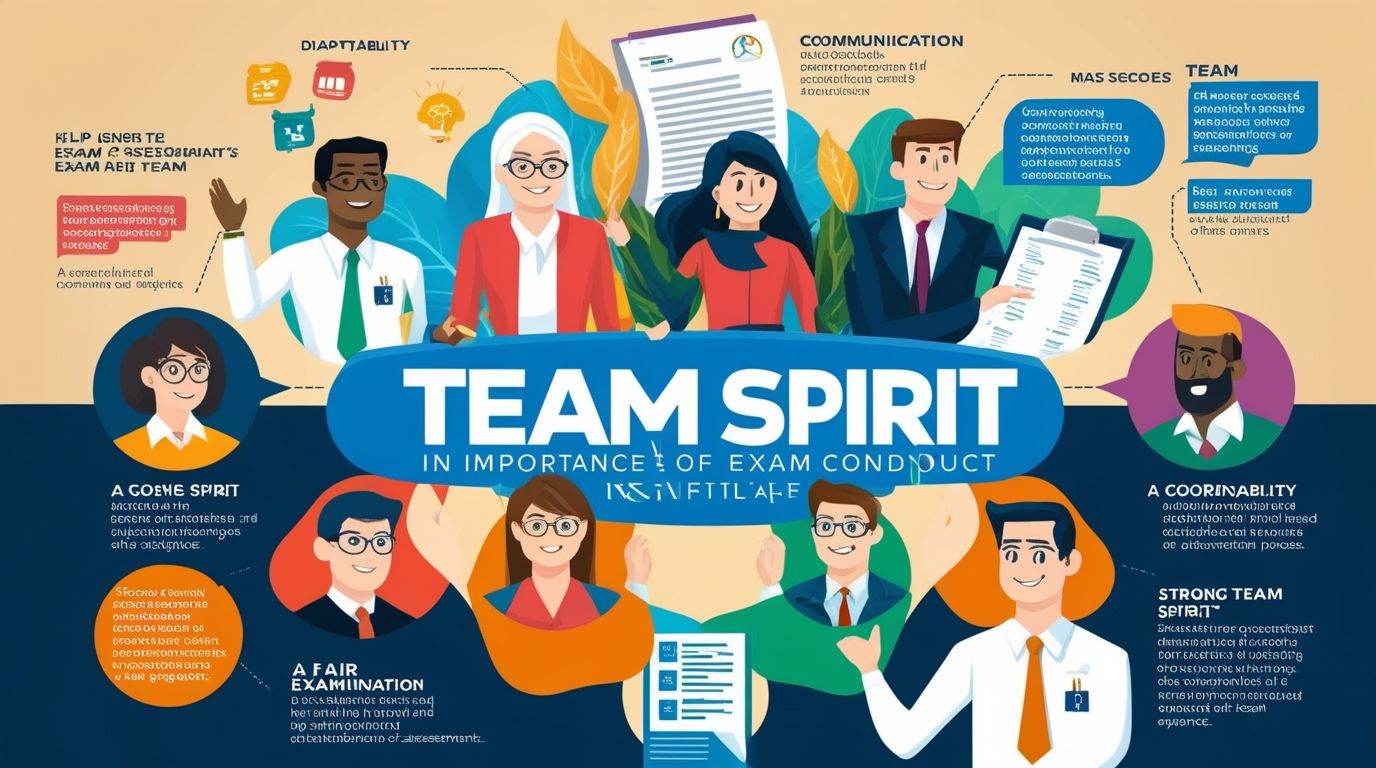Importance of Exam Conduct Team Spirit, Exams are a crucial aspect of education, assessing students’ knowledge, skills, and abilities. While the focus is often on the individual taking the test, the successful administration of exams depends heavily on a collaborative effort behind the scenes. This is where the concept of team spirit in exam conduct becomes essential. A well-coordinated team working in harmony can ensure a smooth, fair, and efficient examination process. This article delves into the importance of team spirit during exam conduct, exploring how teamwork impacts exam preparation, execution, and post-exam activities. It will also examine the benefits of fostering a team-oriented culture and the strategies that institutions can employ to strengthen collaboration among exam conduct teams.
The Role of Exam Conduct Teams
Exam conduct teams are responsible for overseeing and managing various aspects of the examination process. This includes pre-exam preparations, ensuring the smooth conduct of the exam on the day, and managing post-exam responsibilities such as grading and reporting results. These teams typically composed of multiple individuals, such as exam coordinators, invigilators, technical staff, and administrative personnel, all working together to ensure the examination process runs efficiently.
Without effective teamwork, the exam process can disrupted by miscommunication, delays, or errors, which can negatively impact both the students and the institution. A team that embodies strong team spirit, however, can handle challenges effectively and maintain a high standard of professionalism.
Key Aspects of Team Spirit in Exam Conduct
Team spirit in exam conduct involves a sense of unity, mutual respect, and shared responsibility among the members of the exam administration team. There are several key aspects that define strong team spirit:
- Clear Communication: Effective communication is the backbone of teamwork in any setting, and exam conduct is no different. Clear communication ensures that all team members are aware of their roles and responsibilities, timelines, and any changes in procedures. Misunderstandings or gaps in communication can lead to errors such as incorrect exam materials being distributed or students being misinformed about exam protocols.For instance, exam invigilators need clear instructions on seating arrangements, timing, and emergency procedures. Administrative staff must communicate with coordinators to ensure that all necessary resources, such as exam papers and equipment, are available and functioning. Regular meetings and briefings before and during exam days can help reinforce communication channels within the team.
- Collaboration and Cooperation: In exam settings, no task accomplished in isolation. Team spirit fosters collaboration, where team members are willing to assist each other and share the workload. This cooperation becomes particularly important when unexpected challenges arise, such as a technical issue with the exam platform or a last-minute change in exam schedules.By working together, team members can quickly find solutions to problems without causing unnecessary delays or disruptions. For example, if an invigilator falls ill on the day of the exam, team members who are familiar with the role can step in to cover the responsibility without impacting the students’ experience.
- Mutual Trust and Respect: Trust and respect among team members are foundational to effective teamwork. When team members trust each other to fulfill their responsibilities, they can focus on their own tasks without worrying about potential gaps. Respect for each other’s expertise and contributions fosters a positive work environment, reducing friction and misunderstandings.In the context of exam conduct, trust is essential for tasks like exam paper security, time management, and ensuring academic integrity. Team members must trust that everyone is following the protocols to maintain fairness and transparency during the exam.
Further more Key Aspects of Team Spirit in Exam Conduct:
- Adaptability and Problem-Solving: Exams can be unpredictable, with challenges arising at any stage of the process. These challenges might include technical malfunctions, absenteeism, or even emergencies such as power outages. A team with strong spirit can adapt quickly to these situations, brainstorming solutions together and executing contingency plans efficiently.For example, if an online exam platform experiences downtime, technical staff need to coordinate with invigilators and the administrative team to either restore the system quickly or shift to an alternative method without compromising the exam’s integrity. Adaptability and collective problem-solving allow the team to stay focused on the primary goal: ensuring that students can complete their exams without undue stress or complications.
- Shared Responsibility and Accountability: Team spirit fosters a sense of shared responsibility, where each member understands that the success of the exam process depends on everyone doing their part. This shared responsibility helps prevent the blame game when things go wrong, as the focus remains on solving the problem collectively.Accountability is equally important. Each team member must take ownership of their specific role, ensuring that they carry out their duties to the best of their ability. For example, an invigilator who is responsible for monitoring students during an exam must remain vigilant, while the technical team ensures that all necessary devices or platforms are working correctly. When everyone is accountable, the team functions more smoothly and with fewer disruptions.

Benefits of Team Spirit in Exam Conduct
Fostering team spirit within an exam conduct team has numerous benefits, both for the team members themselves and for the broader educational institution. Some of the key benefits include:
- Increased Efficiency and Productivity: Teams that work well together can accomplish tasks more quickly and efficiently. When everyone understands their role and works in harmony with others, the exam process runs more smoothly, with fewer mistakes or delays. This efficiency is particularly important when handling high-stakes exams with tight deadlines.
- Enhanced Problem-Solving Capabilities: A team with strong team spirit is more adept at handling challenges. When problems arise, team members can pool their knowledge and skills to find solutions quickly. The collective expertise and experience within a team can lead to more creative and effective problem-solving compared to individuals working in isolation.
Benefits of Team Spirit in Exam Conduct
- Improved Morale and Job Satisfaction: A positive team environment can boost morale and job satisfaction among team members. When individuals feel supported and valued by their colleagues, they are more likely to stay motivated and engaged in their work. High morale within the team contributes to a more positive atmosphere during exams, which can, in turn, reduce stress for both students and staff.
- Ensuring Fairness and Integrity: Strong team spirit is critical to maintaining the fairness and integrity of the exam process. When team members trust each other and work together, they can ensure that all students are treated equally, that exams are conducted according to established protocols, and that any incidents of academic dishonesty are addressed promptly and fairly.
- Reduction of Errors and Risks: Teams with good communication and collaboration are less likely to make mistakes that could compromise the exam process. For instance, proper coordination between exam administrators and technical staff reduces the risk of technical failures that could disrupt an online exam. Similarly, clear communication among invigilators minimizes the chances of mismanaging student seating arrangements or exam timings.
Strategies to Foster Team Spirit in Exam Conduct Teams
Building team spirit requires deliberate effort and a supportive work culture. Educational institutions can implement several strategies to strengthen collaboration and teamwork among their exam conduct teams:
- Regular Training and Team-Building Activities: Providing regular training sessions that focus on communication, problem-solving, and teamwork skills can enhance team cohesion. Team-building activities, such as workshops or collaborative exercises, can help team members develop trust and learn how to work together more effectively.
- Clear Role Definitions and Responsibilities: Clearly defining the roles and responsibilities of each team member helps avoid confusion and overlap in tasks. When everyone knows what is expected of them and how their work fits into the larger picture, they can focus on their specific duties while contributing to the team’s overall success.
- Open Channels for Communication: Encouraging open and transparent communication within the team is essential for building trust and collaboration. Team members should feel comfortable discussing concerns, asking questions, and offering suggestions. Regular meetings and briefings help keep everyone on the same page and ensure that any potential issues are addressed before they escalate.
- Leadership and Support: Strong leadership is vital for fostering team spirit. Leaders should set the tone for collaboration, encourage open communication, and provide support when needed. Leaders also play a key role in resolving conflicts and ensuring that all team members are working toward common goals.
- Celebrating Success and Acknowledging Contributions: Recognizing the efforts and achievements of team members can boost morale and reinforce team spirit. Whether through formal recognition programs or informal expressions of gratitude, acknowledging the hard work and dedication of the exam conduct team fosters a sense of pride and belonging.
Conclusion
The importance of team spirit in exam conduct cannot be overstated. A coordinated, collaborative effort is essential to ensuring that the exam process runs smoothly, fairly, and efficiently. By fostering team spirit through clear communication, collaboration, mutual trust, and adaptability, exam conduct teams can not only enhance the exam experience for students but also create a more positive and productive working environment for themselves. Institutions that prioritize team-building and support their exam conduct teams will ultimately contribute to the integrity and success of their educational assessments.

10 thoughts on “Importance of Exam Conduct Team Spirit”
Comments are closed.